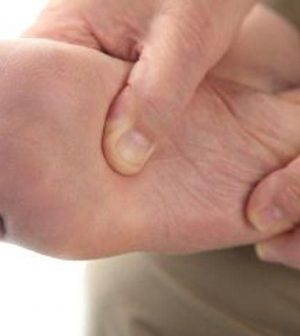- Could Artificial Sweeteners Be Aging the Brain Faster?
- Techniques for Soothing Your Nervous System
- Does the Water in Your House Smell Funny? Here’s Why
- Can a Daily Dose of Apple Cider Vinegar Actually Aid Weight Loss?
- 6 Health Beverages That Can Actually Spike Your Blood Sugar
- Treatment Options for Social Anxiety Disorder
- Understanding the Connection Between Anxiety and Depression
- How Daily Prunes Can Influence Cholesterol and Inflammation
- When to Take B12 for Better Absorption and Energy
- Epsom Salts: Health Benefits and Uses
COVID Can Leave People With Lingering Nerve Damage

For many people, damage from COVID-19 continues well beyond the initial infection. A case in point: Pain, tingling and numbness in the hands and feet can occur for weeks or months afterward, a new study reveals.
The researchers surveyed more than 1,550 patients who underwent COVID-19 testing at the Washington University Medical Campus in St. Louis over a 10-month period early in the pandemic. Those who tested positive (542) were about three times more likely to report pain, numbness or tingling in their hands and feet (peripheral neuropathy) than those who tested negative, according to the study.
“We found that nearly 30% of patients who tested positive for COVID-19 also reported neuropathy problems at the time of their diagnosis,” said study co-author Simon Haroutounian.
“For 6% to 7% of them, the symptoms persisted for at least two weeks, and up to three months, suggesting this virus may have lingering effects on peripheral nerves,” he added in a university news release.
Some of the patients with neuropathy symptoms sought treatment at the university pain center, but most had mild to moderate symptoms and may not have sought help from a pain specialist, said Haroutounian, who is chief of clinical research at the pain center.
“Several viral infections — such as HIV and shingles — are associated with peripheral neuropathy because viruses can damage nerves,” he noted.
“In the case of HIV, we didn’t realize it was causing neuropathy for several years after the AIDS epidemic began. Consequently, many people went undiagnosed with neuropathy and untreated for the pain associated with the problem,” explained Haroutounian, who is also an associate professor of anesthesiology.
The same may be true for patients with neuropathy following COVID-19, he said. Regardless of the cause, however, treatments for neuropathy are similar.
“There is a high likelihood we could still help these patients, even though at the moment there are not clear diagnostic criteria or even a recognized syndrome known as COVID peripheral neuropathy,” Haroutounian said.
Because the study was conducted at a single center, further research is needed to replicate the findings, he pointed out.
“We also finished our data collection before vaccinations became widespread and before the Delta or Omicron variants arrived, and it’s difficult to say what effects those variables may have,” Haroutounian added.
The findings were published online March 24 in the journal Pain.
More information
The Foundation for Peripheral Neuropathy provides guidance after a peripheral neuropathy diagnosis.
SOURCE: Washington University, news release, March 24, 2022
Source: HealthDay
Copyright © 2026 HealthDay. All rights reserved.










